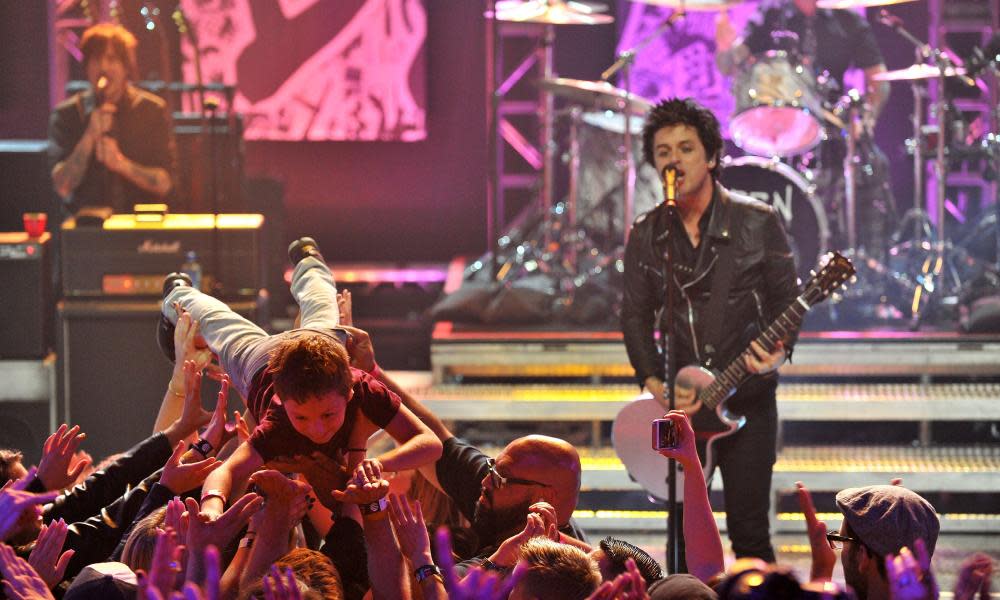‘It’s the rawness’: why Green Day and 90s punk still resonates with today’s young music fans

As a young rock fan, 18-year-old Joe from Wiltshire feels little is on offer to him musically. “Today’s rock music hasn’t really hit the heights for me,” he says. “The energy isn’t captured as well, or it’s lyrically lacking.” That view was reinforced three years ago when he first heard his favourite band, Green Day. Minnesota-based Ravlin, 14, has a similar outlook – he loves the “rawness” of their music: “Most modern rock groups sound similar and low-energy.”
Whatever one thinks of most modern rock groups, it’s undeniable that Green Day, along with certain other now-heritage bands, are still attracting new crowds. Blink-182 tour arenas and, according to their label, Sony, 49% of their regular streamers are under 30. Emo figureheads My Chemical Romance amassed hordes of teenage fans in the period after their 2013 breakup, who have all bought expensive tickets to their reunion shows this summer.
Marie, a Londoner who runs a fan website, Green Day Inc, tells me the band still top “any rock or alternative playlists on Apple Music or Spotify; you read interviews with new artists like Twenty One Pilots or the 1975, and they always cite Green Day as their influences,” she says. She is always surprised at how young the fans who follow her page are. “Even as a 28-year-old, they make me feel so ancient.”
Wyatt Wendels, host of the New Rock Show on radio station Planet Rock, thinks that compared with most artists of the genre, Green Day are still full of life and punky values. “But,” he says, “if anyone could give a definitive answer to how bands can continue to have a youthful audience, every band would be set for life.”
Can we at least approximate that winning formula? It can’t just be these bands are simply better than modern acts whose members are closer to the age of their listeners. For Ian Winwood, author of Smash! Green Day, the Offspring, Bad Religion, NOFX, and the 90s Punk Explosion, these bands are from “a time when albums meant something. It’s difficult now for rock groups to build a body of work that can be used to keep a momentum going for years and years.” With 1994’s original teen-anthem-filled Dookie and 2004’s politically engaged American Idiot behind them, Green Day are a household brand whose T-shirts are sold by Asos and Sports Direct.
Young fans I spoke to cared far less for Green Day releases of their own teens such as 2012’s albums Uno, Dos, and Tré – they preferred the crude, relatable Dookie and still-relevant American Idiot, the anti-conservative stance of which could have seen it released in 2020. Liam, 14, from Ontario, describes these albums as “pure gold” that represent Green Day, the band and brand.
To the band’s credit, they have evolved for the interests and insecurities of each generation of punk-leaning teen. Dookie was for every outcast; American Idiot for the politically minded youth, and 2016’s Revolution Radio for those all too aware of social media’s omnipotence.
The band share the minutiae of their lives online, and their cool children come as part of that package. Blink-182 drummer Travis Barker’s teenage daughter Alabama is an Instagram influencer, and his son Landon is a rapper; Billie Joe Armstrong’s son Joey is drummer in the band Swmrs, while another son, Jakob, records as Jakob Danger. When Billie Joe and Billie Eilish appeared in Rolling Stone together in October 2019, both with dark, dyed hair and pouts as identical as their names, it felt like a natural pairing.
Green Day, then, may be the most relevant 90s rock artists still making new music. And even if that new music doesn’t always resonate, there will always be Dookie, when the band encapsulated the evergreen teen experience: masturbatory, irritable and struggling to figure out exactly who you will be.

 Yahoo News
Yahoo News 
